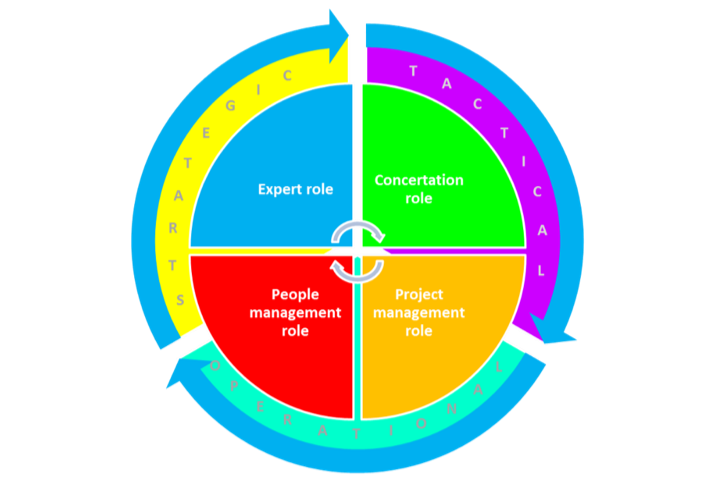Our management model
Wat is the difference between a manager and a ‘non-manager’?
The difference is in the additional dimensions of the role. It’s no longer just about what you can bring to the role as an individual (your expert role),but you get a whole set of additional responsibilities, that are not always clearly defined.
People Management Role: how do you give direction to your team, how do you get people to evolve and grow, how do you give them feedback? People often assume that this is something ‘we know’, or we learn by doing – but it is so much easier and more effective to first know and understand human behaviour, and how you can influence others positively.
Concertation Role: people rarely tell you, but as a manager you also have a responsibility to work together with your peers and your manager, across departments.
And sometimes you also get a project management role.
You no longer just work on the operational level. You regularly step up to the tactical level to see how you could approach things in a more structural way. You might give input to the strategical level, and in any case, you ensure that the activities of your department are aligned with the strategy.
We help you to create the necessary time for these additional responsibilities, so that you can keep all the balls in the air – your way.
Training helps you to build your Company Culture
Culture is what people do when no one is looking – Herb Kelleher
The culture of a company is usually something that has developed naturally: inspired by the founder, continued or adapted by his successors, brought to life by the people working for the company. And sometimes that is exactly what you want, and sometimes you would prefer to see it a bit differently. But how do you change something so intangible?
Organizing internal trainings can be an ideal way to build a common language, and to ensure that people will start holding each other accountable to the group values and norms.
If you organize a training around soft skills for a full team, this will often be a more powerful experience than a playful teambuilding, because people will get to know each other better as colleagues as well as on a more personal level. As one of our participants said: ‘we have been working together for so long, but since this training I realize that we didn’t know each other at all – and we certainly weren’t a team’.
Even with people from different teams, you will see a change in the way they work together. In our trainings we create the safety and the common vocabulary so that people can address those topics that are normally avoided. Participants start to talk to each other instead of about each other.
Contact us Back to Training and Coaching
